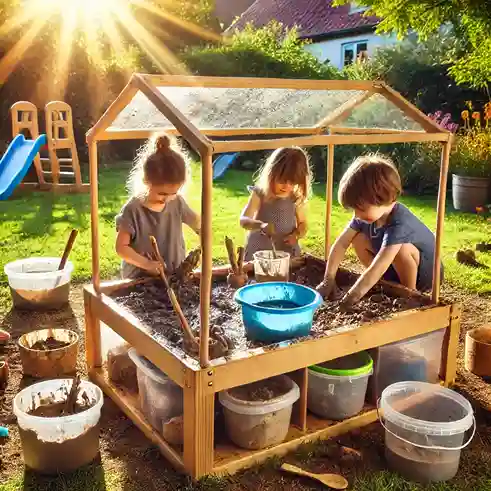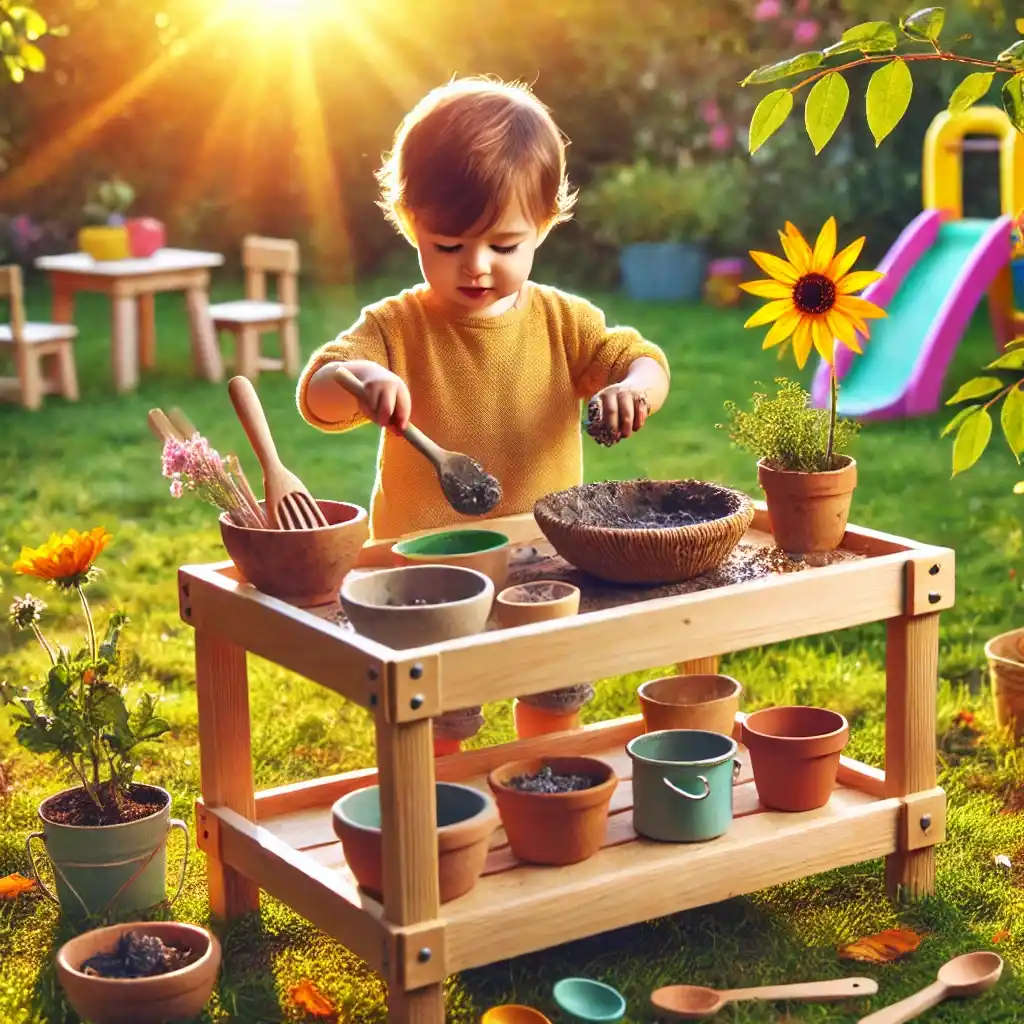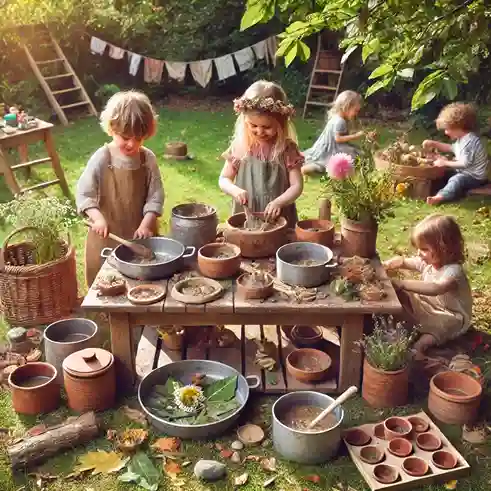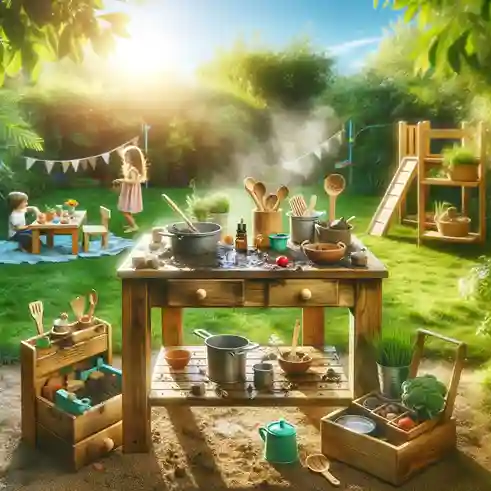Introduction to Outdoor Mud Kitchen
Children can Let their imaginations run wild in outdoor mud kitchens as they engage in sensory experiences which are proven to be fun and cause creativity to stem. These rustic play areas usually consist of a work surface made of natural materials like wooden pallets, repurposed kitchen utensils and other various containers to mix and create. Kids are stimulated to grab soil from the ground and add water along with garden tools to come up with creations such as ‘nature stew’ or ‘mud pies’. Due to their unstructured nature along with the rich sensory content of the environment makes them explore the basic components which are critical for young people.
Parents and school workers have taken great interest in outdoor mud kitchens due to the growth they assist children to acquire. They do not simply allocate space for children to create a mess, instead these kitchens act as a hands-on experiment and promote sensory activities. Children are able to think critically and foster their curious minds by allowing them to observe their surroundings and touch a few things. Also, mud kitchens are easy to incorporate into classes where there are tasks involving the child applying their knowledge and learning by doing rather sitting in a classroom, meaning they are self-sufficient in their understanding.
As parents and caregivers understand that outdoor activities help kids enhance their creativity, outdoor mud kitchens have surfaced as an entertaining and playful idea. Not only do these add to touch and feel play, but they also enhance collaboration skills as the child invites friends to join them in cooking. With more number of studies being brought to fore in support of the necessity of outdoor play, mud kitchens are one of the simplest ways in which children’s imagination and creativity can be nurtured as well as an activity in which they would enjoy being a part of.
Promoting Role Play and Creative Thinking
As a child grows, parents use a mud kitchen outdoor as part of outdoor play because it helps the children to be more imaginative and creative. Such playsets are very flexible, and children can role play as a chef, a gardener, or a scientist. This not only encourages children to play outside, but also provides them with a sense of purpose and encourages critical and analytical thinking. Making mud pies, potions, or other food items, encourages children to devise their own recipes, rolling, moving and touching different materials.
For example, if a child chooses to be a cook then that child can start by collecting materials from the garden like leaves, twigs or some mud. This simple activity of collecting materials can go onto a bigger narrative where the child makes a menu for a ‘restaurant’ that he/she/they have created in his/her/their mind. While engaging in this role play, they will also talk to other children whereby they will decide who will be the baby in charge of the restaurant and who will be playing the customers. Such engagement not only encourages them to think but also helps them in gaining basic social skills because here, as kids, they learn to work in a team and speak to other children.
Also, mud kitchens create spaces that are representative of the real world, enhancing children’s understanding of the world. Children take on the roles they have selected and deal with different scenarios such as preparing the dish or setting a garden. Such play greatly aids their other aspects of growth and development while fostering creative and critical thinking skills. In addition, these situations may also improve emotional intelligence as children develop the capacity to convey their thoughts and emotions through various forms of play. In short, outdoor mud kitchens are not merely play centers, but creative areas where creativity and role play great develop in children as well as develop their brain function meaning that the children’s abilities are boosted.
Improving your Fine Motor Skills
As for your mud kitchens, engaging children in mucking the mud kicthins densely develops their fine motor skills which are important in several areas related to early childhood activities. Mud kitchens involve activities such as mixing, pouring and molding that engage small muscle groups in the hands and fingers as such developing motor skills and coordination. As these children go deeper and deeper into play, they do not realize that such activities are actually working their muscles that are important for writing, buttoning shirts and performing any types of tasks that involve small objects.
But the act of pouring muddy mixtures from one container to another is a struggle of coordination because it has a grip in it as well. Children have to direct the flow and where the mud goes which expands their knowledge on spatial perception. Also, allowing himself\herself to be free and mold shapes from mud enables them to practice pressure and texture which develops their sense of touch. These opportunities to play around are actually core pieces in accumulating the set of skills that will assist children in a number of exercises as they grow.
Experts say that such level of activity decreases the chances of cognitive and physical underdevelopment. It has even been suggested that critical thinking skills are better developed if fine motor skills are advanced first as children get to explore their environment constructively. The mud kitchen environment is perfect for this as children are able to get messy while acquiring important life skills. There are even more materials that extend their imagination and play, like sticks, leaves and stones. Engaging with outdoor activities such as outdoor mud kitchen allows them to create connections among their little senses, movements and skills that will surely influence future learning.
Promoting Sensory Experiences.
Children can greatly benefit from outdoor mud kitchen, especially in terms of sensory experience, since they come into contact with different natural resources. Warm mud, for instance, is a cool substance to play with giving kids a smooth and flexible experience. Other materials like sticks, flowers, and stones add different textures resulting in a sensory experience. The gritty, cool feeling of mud would also be balanced when combined with flower petals that are on the other extreme of the smooth texture, all these would stimulate children’s senses and push them to experiment.
As a bonus, kids also enhance their sensory play by exploring color and scent found in their immediate environments. There are the intense greens of grass and leaves, the earthy and wooden brown, not forgetting the multitude of colors that bloom into flowers. These elements do not only attract a child’s attention but also help them innovate when preparing their own foods as they incorporate these aspects into their creative works. The scents that accompany plants and soil can trigger different emotions and in that way, heighten a child’s feeling during the play. These kinds of sensory experiences are very crucial as they build different neural pathways in the brain of a young person.
It has been claimed that playing and working with sensory materials contributes to important milestones in a child’s development such as emotional and cognitive development. Studies have shown that children do not only enjoy playing with different textures and smelling various scents, but this also encourages their brain activity and helps with emotional control. They use materials in the outdoor mud kitchen and experiment with what happens when they do this or that which helps to enhance their problem-solving and social interaction skills with their counterparts. Thus, outdoor mud kitchen are very important resources that facilitate the physical, emotional and cognitive development of a child through the sense of touch.
Encouraging Social Skills and Teamwork
Outdoor mud kitchens turn out to be the energetic places where children interactively and collaboratively play which further contributes to the advancement of their social interaction and teamwork skills. Such settings are beneficial as they allow children to come together, pool in resources and take part in activities hence nurturing their social skills in relation to peers’ interaction. Participating in group cooking activities or making mud pies draws their interests and helps in strengthening a sense of togetherness among the children.
In an outdoor mud kitchen, children can take on a variety of responsibilities – as a chef, gardener, or server – which stimulates role play that focuses on cooperation. This type of play encourages children to negotiate on how to mix the constituents or what the better option of the recipe is to make, hence communication skills are valued. For example, one child may say, ‘we will gracefully cover them with leaves’ and another says, ‘wait! I think flowers will make it look nicer.’ Such conversations not only enhance the child’s imagination but also improve the basic communication skills needed for social interaction in relation to the child’s ability in speaking and listening through the exchange of ideas.
In addition, collaborative experiences in a outdoor mud kitchen allow children to acquire important lessons of cooperation. They begin to appreciate the sharing of tools and the aim of working together for instance in making a wonderful meal set for their imaginary friends. This experience is significant for the early childhood academic experiences because it helps them in building their team working skills which will help them in performing other works in their lives such as working in school projects and later in their workplaces.
Outdoor mud kitchen provide children with a great opportunity to connect socially which enhances their ability to work together with their peers. This kind of experience is fundamental in character formation as well as development of key life skills particularly in their early years in an enjoyable atmosphere.
Increasing Environmental Consciousness

Outdoor mud kitchen are quite a one-of-a-kind medium through which children can learn to relate with nature in a better way. Playing outdoors helps children to use the natural ingredients like soil, water and plants and appreciate the environment more. Playing creatively with these natural resources makes children understand the essence of trees as well as make them more conscious of the environmental problems.
Children learning through playing in a outdoor mud kitchen foster an understanding of several concepts that concern sustainability. For example, by gathering and playing with mud, leaves and stones, they start to understand how these elements are related to their ecosystem. This approach doesn’t only make education more fun for learners but also ensures that some pertinent issues relating to environment are presented in a way that people can understand. The outdoor mud kitchen provides children with a platform to indulge in practices while being aware of the importance of using available and natural materials.
Moreover, through such type of collaborative play, children develop a sense of appreciation towards nature. Many concepts related to the muddy ecosystems can be better understood when children work together while stirring the pots in their outdoor mud kitchen. For instance, when they begin to experiment with the available plants in the garden or a nearby park, they gradually learn the importance of protecting such ecosystems not only for themselves but for future generations.
In addition, bearing in mind the alterations of the weather and the seasons as children play outside also builds on their environmental awareness. Such interactions may lead to questioning where materials and resources come from and what human activities are doing to these resources. By means of creative engagement through play in outdoor mud kitchen, not only do children have fun, they also develop an environmental awareness that has the potential to grow into a concern for the environment throughout their life.
Supporting Risk-Taking and Resilience

Outdoor outdoor mud kitchen appear to be an excellent context which allows children to take risks in the course of their creativity. Placing children where mud, water, leaves, stones and other natural elements are present enables these children to play and discover. This allows them to interact with the environment in a way that can help them learn starting from the most basic concepts of physics, chemistry and even ecology. For instance, the child may understand the concept of mixing different textures and densities ad by mixing mud and water or sandy soil, thus understanding the properties of materials.
While playing with others, kids always try to surpass their limitations. With a outdoor mud kitchen outside, kids can take safe risks, such as how much water should be put in mud in order for it to be the right texture or how strong their structures are. This enables kids to achieve goals such as exercising determination. At these moments, where a structure may fail or an experiment simply does not work, they are important teaching moments. They let kids change their plans and that helps them to be more persistent and creative in solving problems.
Children’s outdoor mud kitchen greatly instills confidence in them as they can see what their work has resulted, actually the outcome. Every mixture or project that is completed increases their confidence in what they can do. This is important to be able to build up resilience, so that whether they achieve their goals or not, they can handle the situation better. Therefore, without a doubt, playing outside with the outdoor mud kitchen increases creativity and also plays a big role in developing the important skills of risk taking and resilience which can be helpful in the future.
Integration with Learning via Play

Within the past few decades, the emphasis on integration of learning through play has been given to prominence, especially in relation to early childhood education. outdoor mud kitchen offer a different approach to learning since children explore and create by involving themselves in such practices. These outdoor play areas are great sources for several learning opportunities that are attuned to the set standards for early childhood learning.
For example, when children are given a task to measure and mix soil, water, and leaves, they do not know that they are actually using basic mathematical skills. It simply gives them an idea on the volume and measurement as well as the comparison when they decide the amount of each ingredient to put in their mixture. This experience can be developed by furthering her integration of such activities by using simple mathematical games that require children to count the number of spoonfuls or use recipes in which they add and subtract certain items.
outdoor mud kitchen play also merges perfectly with science learning. As children manipulate various materials, they can be introduced to cause and effect by noticing how the dough changes when water is added or how mud melts under the sun. Teachers may provide some scientific experiments for solving problems related to the environment, for example, how mud cake dries, which would stimulate the children’s imagination and thinking skills.
Embellishing literacy development is another advantage of incorporating outdoor mud kitchen. Children can tell wonderful stories and spice them up using the toys made of mud. Forcing them to name the items they put in their play or to write down a recipe builds their vocabulary and develops rudimentary writing skills. Group activities, for example, getting children in a circle and asking them to talk about the stories they generated with the toys, improve language and social skills.
To summarize the main points, one can say that outdoor mud kitchen are amusing and creative add-ons to children, which also transform the same into motivated spaces where interrelated concepts of teaching in context of mathematics, science, and reading are influenced through the spirit of creativity and joy. Thus, acknowledging the teaching possibilities of these outdoor kitchens would enable the teachers to offer enriching opportunities for the overall child development.
Conclusion: The Importance of Outdoor Play Experiences
As we consider the benefits that increase the level of outdoor mud kitchen, it is also important to note that they are effective for children in more ways than just recreation. At the same time, these and other engaging play areas enable a child to create scenarios in their minds and seek to actualize them and in this way stimulate their inquisitive nature. Playing with mud also builds the sensory aspect and aspects of knowing as children learn through playing in their environment.
In addition, outdoor mud kitchen are social tools since they increase interaction amongst children. Playing together positively helps children to share, communicate and resolve issues, which are important in their future lives. It also enhances health by providing avenues for active play which is fundamental for growth and fitness.
Children are able to go outdoors and interact with the environment which gives them motivation and purpose to take care of the environment and connecting them more with nature, and therefore, outdoor mud kitchen help in providing such opportunities. This connection often fosters a concern for the environment and develops eco-friendly habits from an early age.
Given the numerous benefits, it is evident that the inclusion of an outdoor mud kitchen in the playtime is a worthwhile investment in a child’s development and learning. Parents and educators should be motivated to consider the provision of these imaginative areas within their outer spaces and classrooms. The enrichment provided by outdoor mud kitchen serves not only to improve the complete child growth but also equip the children with skills and competences which will be with them for the rest of their lives. In doing so, healing their creativity, as well as their will, we can really say we teach these children ‘learning through play’ principles – and practices!

